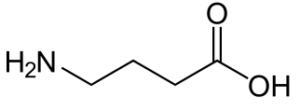GABA (gamma-aminobutyric acid) is an amino acid and neurotransmitter. GABA is the primary inhibitory neurotransmitter of your central nervous system. Its role is to keep glutamate, the primary excitatory transmitter, from overwhelming you.
Too much glutamate can cause a seizure, and too much GABA can put you in a coma. A healthy brain maintains a critical balance of GABA and glutamate.
GABA acts like a “brake” on neuron circuits during stress. Low GABA levels can result in anxiety, insomnia, poor mood and restlessness.
Clinical studies show that boosting GABA with a supplement relieves anxiety, stress, and boosts the production of alpha brain waves.[i] If GABA is optimized in your brain you’ll feel focused, relaxed and stress-free.
GABA helps:
- Balance mood. GABA has an inhibitory effect on overly stimulated neurons. Low GABA levels lead to anxiety, depression and insomnia. GABA helps restore that balance. Promoting a more positive mood which improves focus and relaxation.
- Boost Human Growth Hormone. Bodybuilders and athletes use GABA before resistance training. Studies show GABA supplements boost blood levels of Human Growth Hormone. Promoting greater recovery support and lean muscle.
- Recovery from addiction. Some addiction doctors have been administering drugs that enhance the brain’s GABA-receptors. Normalizing GABA receptors takes away the craving and anxiety that one would typically experience in the absence of the addictive drug.
Overview
Gamma-aminobutyric acid (GABA) is the major inhibitory or relaxing neurotransmitter in your brain.[ii] GABA’s primary role is to keep the major excitatory neurotransmitter glutamate in check.

GABA isa naturally occurring amino acid synthesized in brain cells from glutamate. It’s estimated that 40% of the synapses in the human brain work with GABA and therefore have GABA receptors.
GABA enhances normal sleep cycles, and improves blood pressure. GABA stimulates the pituitary gland to secrete Human Growth Hormone. And helps produce endorphins that make you feel good after a workout or sex.
When you normalize GABA levels you’ll experience a reduction in anxiety, insomnia, nervousness, restlessness, lowering blood pressure, and stress.
GABA benefits
The amino acid L-glutamine is the precursor to GABA production in your body. L-Glutamine is a precursor the synthesis of L-glutamate. Glutamate is your body’s most abundant excitatory neurotransmitter. Which is responsible for attention span, brain energy, learning ability, memory, and staying awake.
An enzyme called glutamate decarboxylase converts glutamate to GABA. It does it with the help of the active form of Vitamin B6 (Pyridoxal-5-Phosphate (P5P)).
The amino acid taurine helps increase the communication and productivity of this enzyme. And zinc helps the release of GABA from its receptors.
When this process works efficiently, you feel relaxed with no stress or feelings of anxiety. And if you are dealing with insomnia symptoms you should get a more restful night’s sleep.
GABA Increases Human Growth Hormone
 Bodybuilders and athletes use supplementary GABA to help repair and support muscle function. And there are several studies supporting the notion that GABA increases Human Growth Hormone.
Bodybuilders and athletes use supplementary GABA to help repair and support muscle function. And there are several studies supporting the notion that GABA increases Human Growth Hormone.
In one study, researchers worked with 19 subjects who were given a single oral dose of 5 grams of GABA. 18 subjects were given a placebo during this trial.
3 hours after the administration of GABA, blood samples were taken. The team reported that “GABA caused a significant elevation of plasma growth hormone levels”.[xi]
GABA helps Reduce Insomnia
A Los Angeles study conducted a randomized, double-blind, placebo controlled trial with 18 patients with sleep disorders. The patients received either a placebo, or Gabadone (a combination of GABA and 5-hydroxytryptophan).
The difference between the two groups of sleep-deprived patients was significant. The Gabadone group fell asleep faster, stayed asleep longer, and had a better quality of sleep than the placebo group.[xii]
- Source: Nootropicsexpert.com


Share:
Everything You Need To Know About Nootropics
NMN intake: How long before you feel the positive effects?